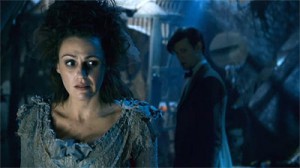Welcome to part 2 of a 2-part series on why I love Doctor Who… aka my love affair with a bicardiac extraterrestrial. When we left off in Part 1, I was finishing up first reason for Whovianism, which is quite perfectly conveyed by this quote:
“It’s about the triumph of intellect and romance over brute force and cynicism.” – Craig Ferguson

Lovely, right? I think so. Anyway, before I continue, I feel like I should make a disclaimer that my experience of the Doctor comes mainly from the new 2005 series, which chronicle the adventures of the 9th Doctor, on. I’ve seen episodes here and there of the pre-hiatus series, but not enough by which I can create a well-formed opinion. This, of course, is to be remedied. Moving on…
My second reason for loving the series has more to do with the nature of the show than its content. The reason being: Doctor Who isn’t bound by the science fiction genre. True, it outwardly presents itself as a science fiction show, complete with aliens, time travel, spaceships, and the the like. Those sci-fi elements, however, are not the central impetus for the plot of every episode. They’re more of a backdrop against which the stories are told. As such, you’ll see very sci-fi heavy episodes like the recent “Journey to the Centre of the TARDIS,” while some episodes, like “Midnight,” are more psychological thriller. Doctor Who even has its share of horror in episodes like “Blink,” and touches on sci-fi fantasy in “The Doctor’s Wife.”

What really allows the show to do this is the diverting of focus away from “pure” science fiction, which tended to deal with people’s relationship with technology, space, and the future; and focusing more on the relationships between the characters as a driving force behind the plot. While I understand this might be a point of criticism for some, I happen to enjoy this refocus quite a bit. Not to say that I don’t love science fiction, because I sure as hell do! It’s just that watching the play of personalities against each other, and gaining insight to the character’s minds through their interactions is what really pulls me in. Perhaps all my improv training has me biased in this regard. In improv, there’s a lot of emphasis on relationship between the characters of the scene. That, as improvisers, is what we are trained to use as a vehicle to move the scene forward. Thus, I tend to notice it whenever I watch any kind of media. It’s the first thing I latch on to.
What this means to Doctor Who is that the show is free to shift between different storytelling genres (provided the sci-fi details stays true to the already established world) while still remaining successful as a cohesive narrative, as long as the relationships between the characters are strong. And that, I think, is a wonderful thing.
Oh, yes… one more: Doctor Who never takes itself too seriously. It’s about being childlike, and goofy, and having a sense of wonder. I’m not so sure it would work any other way.
And that, folks, is the codification of my love for the series. That’s why I spend Saturday nights at home, waiting for new episode. That’s why I buy more Doctor Who shirts than I really should, why I carry around my sonic screwdriver in my backpack, why I scour /r/doctorwho on a daily basis. It’s why I’m going back to Gallifrey One next year. Who’s gonna be there? Let’s Who-out together. I think I’d make an ok Strax. I’m not asking everyone out there to start watching, far from it… but I’d definitely join you in a lively discussion once you do! I just want you to know why I don’t stop sharing all those links on Facebook. Alright… that’s all.
Geronimo.

